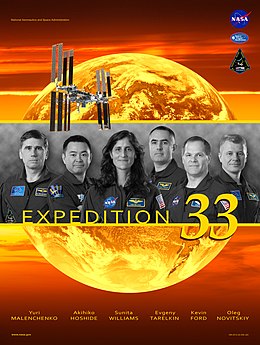Expedition 33
 From Wikipedia the free encyclopedia
From Wikipedia the free encyclopedia
 Promotional Poster | |
| Mission type | ISS Expedition |
|---|---|
| Expedition | |
| Space station | International Space Station |
| Began | 16 September 2012, 23:09 UTC[1] |
| Ended | 18 November 2012[1] |
| Arrived aboard | Soyuz TMA-05M Soyuz TMA-06M |
| Departed aboard | Soyuz TMA-05M Soyuz TMA-06M |
| Crew | |
| Crew size | 6 |
| Members | Expedition 32/33: Sunita Williams Yuri Malenchenko Akihiko Hoshide Expedition 33/34: Kevin A. Ford Oleg Novitskiy Evgeny Tarelkin |
 Expedition 33 mission patch  (l-r) Williams, Malenchenko, Hoshide, Tarelkin, Novitskiy and Ford | |
Expedition 33 was the 33rd long-duration expedition to the International Space Station (ISS). It began on 16 September 2012 with the departure from the ISS of the Soyuz TMA-04M spacecraft, which returned the Expedition 32 crew to Earth.[1]
Crew[edit]
| Position | First Part (September–October 2012) | Second Part (October–November 2012) |
|---|---|---|
| Commander | Second spaceflight | |
| Flight Engineer 1 | Fifth spaceflight | |
| Flight Engineer 2 | Second spaceflight | |
| Flight Engineer 3 | Second and last spaceflight | |
| Flight Engineer 4 | First spaceflight | |
| Flight Engineer 5 | Only spaceflight | |

Notable experiments[edit]
The crew successfully experimented with the Delay-tolerant networking protocol and managed to control a Lego robot on earth from space.[5]
References[edit]
- ^ a b c "Expedition 33". National Aeronautics and Space Administration. Retrieved 16 September 2012.
- ^ NASA HQ (2010). "NASA And Partners Assign Crews For Upcoming Space Station Missions". NASA. Retrieved 8 July 2010.
- ^ "Astronaut Bio: Sunita Williams". NASA. Retrieved 19 February 2011.
- ^ "Selection of Astronaut Akihiko Hoshide as a Member of the ISS Expedition Crew". JAXA. Retrieved 19 February 2011.
- ^ "NASA, ESA Use Experimental Interplanetary Internet to Test Robot from International Space Station". 7 April 2015.
External links[edit]
- NASA's Space Station Expeditions page
- NASA's Consolidated Launch Schedule
- [1] Archived 21 December 2014 at the Wayback Machine

